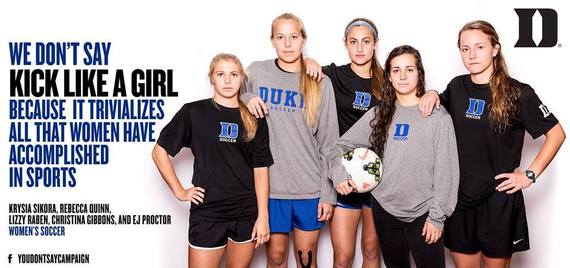Friday will mark the sixteenth anniversary -- the Sweet Sixteen -- of the United States' historic victory over China in the 1999 Women's World Cup. On Sunday, the U.S. Women's National Team (USWNT) faced Japan in Vancouver for another shot at bringing the cup down the short 30-mile trek back to the States. They won in a dominating fashion by a score of five goals to two. Here are ten reasons to celebrate the success of the USWNT.
1. The USWNT ranks higher and wins more than the U.S. Men's National Team.
The most recent FIFA world rankings lists the men at 27th and the women at second behind Germany, whom they defeated last week in the semifinals. In 2014, the women boasted an impressive record of twelve wins, one loss, and three draws. The men, however, finished with just six wins, five losses, and four draws.
2. There is literally not an equal playing field.
The 2015 World Cup marked the first in the tournament's history, for either gender, that did not feature natural grass. Budgetary limits prompted FIFA and the Canadian Soccer Association to elect for artificial turf instead. According to the USWNT medical staff, the turf, which reached the unfathomable temperature of 159 degrees at the National Women's Soccer League semifinal last year, slows recovery times between matches. Not to mention, the turf has a history of scraping and bruising players' legs, made notable by USWNT forward Sydney Leroux's now-iconic tweet.
3. FIFA has laundered money and accepted bribes that could have otherwise subsidized women's soccer.
Who's to blame for the budgetary constraints that caused turf-gate? Look no further than FIFA itself. In just one leg of the latest FIFA corruption scandal, Jack Warner, former head of CONCACAF (the North American soccer/football association), allegedly embezzled 1.6 million dollars to pay personal loans and credit cards.
4. FIFA celebrates USWNT forward Alex Morgan's appearance as much as her success on the field.
On the day of the USA vs. Germany semifinal, FIFA.com ran a profile of USWNT forward Alex Morgan, characterizing her as "a talented goal scorer with a style that is very easy on the eye and good looks to match". In doing so, FIFA has made it clear that women's soccer fan-hood is rooted in the players' attractiveness as much as, or perhaps even more than, their incredible on-field achievements. By supporting women's soccer, we can appreciate women for their athletic prowess and not their physiques.
5. 4 members of the USWNT, including their head coach, are openly LGBT - tying with Sweden for the most in the tournament.
Head Coach Jillian Ellis is open about her sexual orientation, alongside Ali Krieger, Megan Rapinoe, and Abby Wambach, all of whom played in the USWNT's historic win over Japan and were instrumental contributors throughout the tournament.
6. The gender wage gap is amplified in the sports world.
The National Women's Soccer League pays its players $6,000 to $30,000 per year, while Major League Soccer pays the men no less than $50,000. Payouts for the Women's World Cup this year amounted to $15 million. The men last year? A modest $358 million.
7. Women's soccer has exhibited moments that defy gender norms.
In what is now a defining moment for American sports and soccer history, Brandi Chastain tore off her jersey and revealed her black sports bra as she sealed the 1999 World Cup championship. Some critics found her actions distracting and inappropriate, but men had been celebrating in a similar manner for years.
8. "Kick like a girl," "Throw like a girl," and "Run like a girl" are still insults used to degrade girls and women and discourage their athletic pursuits. The USWNT's success counters that.
Over 3 million American youth play organized soccer, and nearly half of them are girls. Many of them will look up to the USWNT as role models. Kicking like a girl should be a goal, not an insult.

Photo by You Don't Say? Campaign/Shayan Asadi
9. Televised coverage of sports favors men 49 times as much as women.
Just 2% of ESPN's SportsCenter airtime was dedicated to women's sports last year. That figure has remained static since 1999.
10. The 2015 USWNT are world champions, and that makes them American heroines!
